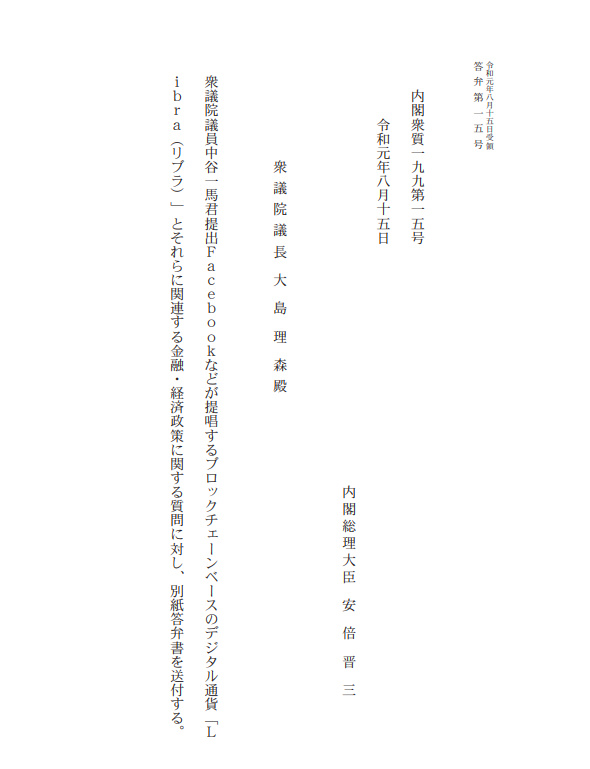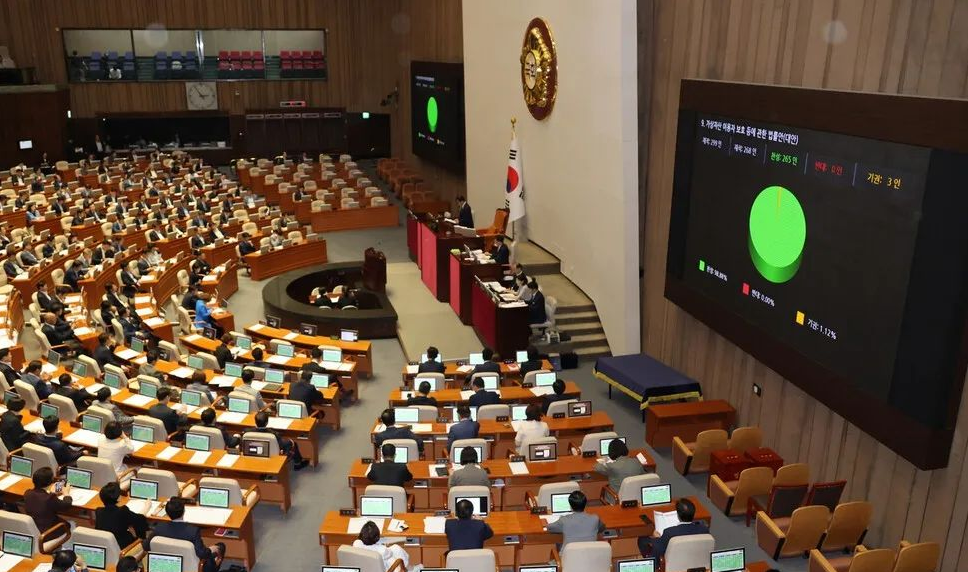Eight questions and eight answers, Japanese Prime Minister Shinzo Abe sees Libra like this
On June 18th, Facebook officially announced its digital currency project Libra, which aims to use blockchain technology to create a cross-border payment digital currency that can be used by humans all over the world. Since the publication of the White Paper, Libra has caused various controversies around the world, and the US-led authorities have also severely criticized Libra.
So, how does the Japanese government view Libra?
On August 1, Japanese politician and member of the House of Representatives of the Constitutional Democratic Party, Mr. Nakagawa, submitted a question about Libra to the Japanese government on the blockchain-based digital currency advocated by Facebook and its related financial and economic policy issues. Questioned.
On August 15, the Japanese government returned a reply to the Honourable Mr. Nakagami on behalf of Prime Minister Shinzo Abe. What is the content of the reply?
- Promoting oil coins, Venezuela has not given up: this is the only way to prevent the depreciation of income
- BCH develops the Cashscript language to build a specific decision-making scheme for autonomous decision-making
- Proof of capacity PoC: Or will "recreate a PoW"? The new project Lava is about to come out
On August 27th, Zhonggu Yima issued a document on “あたらしい経済”, explaining the contents of the inquiry and the reply itself, as well as the Japanese government’s interpretation of the digital currency.

First question – the Japanese government has begun a comprehensive discussion on stable currency
- Zhonggu Yima: For Libra-related issues, the Ministry of Finance, the Financial Services Department, and the Bank of Japan have set up liaison meetings. What is currently being discussed? Can you disclose the details?
- Shinzo Abe: The three-party liaison meeting of the Ministry of Finance, the Finance Department, and the Bank of Japan has comprehensively discussed various arguments about the so-called "stabilized currency" including Libra on July 10, 2019. In the future, we will discuss the issue of stabilizing coins as needed.
Interpretation of the first question: Although the reply stated that the Japanese government has started a comprehensive discussion on the content of the stable currency, the question also mentioned that it wants to know the "details", but there is no substantive answer in the specific reply. The Japanese government’s answer to the opposition party’s question-and-answer book often evades arguments or steals the concept. Although it lists keywords but does not have any substance, this reply is also a typical example.
In addition, it can be said that the Japanese government has not yet conducted sufficient discussions to answer this question.
Second question – explore the impact of stable currencies including Libra on the economy
- Zhonggu Yima: In addition to the liaison meetings set up by the Ministry of Finance, the Financial Department, and the Bank of Japan, there are also agreements between the Cabinet and the Ministry of Economy, Trade and Industry. Does the Japanese government intend to study and discuss the impact of Libra on the economy?
- Shinzo Abe: Research on the impact of stable currencies on the economy, including Libra, will be explored in light of future progress.
Interpretation of the second question: The research status of Libra on the economic impact is that it may be carried out in the future, but at present it will not do anything. What we are seeing is a passive attitude that waits for problems and then takes measures to deal with them. It is not the first pioneer to join the emerging economy.
Although this is an administratively common position, it is regrettable that the government holds such an attitude, given that no matter how the digital currency is considered to become mainstream in the future.
The third question – the Japanese government does not know much about Libra
- Zhonggu Yima: What impact does the government think Libra has on Japan?
- Shinzo Abe: Regarding Libra, it is difficult to answer the impact on Japan because its details are not yet clear. In any case, we will pay close attention to the development of the situation in the future and make appropriate responses based on international public opinion.
Interpretation of the third question: Although Libra's liaison meeting was established, it was not known because it had not been studied. At present, we are thinking while observing the situation of countries around the world. For the destructive innovation that Libra may bring, the Japanese government seems to lack a sense of crisis.
Nakagawa said that the impact of digital currencies such as Libra on Japan should be further studied and applied to the policy.
Fourth question & fifth question – discuss the issue of digital currency in Japan
- Zhonggu Yima: At the meeting of G7 finance ministers and central bank governors, all countries expressed concerns about Libra's possible influence on national currency sovereignty and the function of the international monetary system. With the development of the digital economy in the future, it is foreseeable that the ultra-sovereign global universal digital currency will be popularized in economic activities. It is not only a private enterprise, but it is not difficult for countries to start promoting the issuance of digital currency. Therefore, in order to ensure the validity of financial policy, does the Japanese government consider it necessary to consider issuing the central bank digital currency – CBDC?
- Zhonggu Yima: The International Monetary Fund (IMF) released the report "The Rise Of Digital Money" on July 15, 2019. The report pointed out that in the future, cash, bank deposits, etc. will face the competition from electronic money and digital currency (stabilized currency) anchoring legal currency, which may be surpassed. At the same time, the report raises questions about the stability of the value of electronic money and digital currency. In response to this concern, the report proposes an official, civil-collaborative solution in which the central bank allows the private sector to engage in dialogue and innovation with consumers under the control, while providing the credit and efficiency of savings deposits. Known as the "Synthetic Central Bank Digital Currency" (Synthetic CBDC). How does the government understand this?
- Shinzo Abe: Regarding the state of currency ideals, it is necessary to consider the convenience and security of settlement of the currency, and the impact of issuing the currency on the financial system. From these viewpoints, I hope to continue to explore.
Fourth question & fifth question interpretation: The answer is to explore the possibility of issuing digital currency in Japan. Despite listening to the arguments of the parties, the response did not have a substantive answer in general. In the inquiry, the CBDC issued by the central bank and the Synthetic CBDC jointly issued by the government and the private sector are asked separately. However, from the situation of answering the questions together, they have to worry that although there are outstanding financial professionals, there is no shortage of excellent ones. Financial × technology comprehensive talents?
Nakagawa said that the Japanese government should have a stronger sense of crisis in response to other countries preparing to issue digital currencies. The impact of financial and technological developments and corresponding programs should be considered more seriously.
Sixth question – the Japanese government's view on stabilizing the advantages and disadvantages of the currency
- Zhonggu Yima: About 1.7 billion adults in the world do not have bank accounts. Libra's vision allows users without a bank account to easily manage assets through a digital wallet, and can also send and settle at low commissions. At this stage, Facebook has about 2.7 billion global users. By collaborating with about 1.7 billion people without bank accounts, it is possible to create a huge economic circle across borders.
In the digital economy era, various platforms were occupied by GAFA (Google, Amazon, Facebook, Apple), BATH (Baidu, Alibaba, Tencent, Huawei), and Japanese companies have no sense of existence. Under this circumstance, in order to compete in the platform of the financial technology era, I believe that we should adopt policies to popularize the stable currency of anchoring the legal currency. What is the government’s opinion?
Interpretation of the sixth question: The reply only describes the overall impression of the stable currency. Although it mentions its advantages and disadvantages, the content is very shallow. The reply indicated that because the level of understanding at this stage is not enough, it will consider the response while observing the trends of countries. This statement is still quite passive.
Seventh question – The Japanese government's revised fund-knot algorithm is not intended to hinder innovation and risk companies
- Zhong Gu Yi Ma: Most of the policies implemented by the Japanese government are measures taken after social problems have occurred. In these policies, it is impossible to see that the government has taken the lead in leading the creation and innovation, and has not achieved the bright results. In the virtual currency sector, the government has strengthened its regulation of the virtual currency trading industry to protect users and investors. However, in the balance between regulation and innovation, I believe that it is necessary to propose some strategic and comprehensive policies across provinces and offices. On the other hand, in reality, we can also hear that Venture Firm operators believe that regulation is blocking the voice of innovation.
For example, the recent amendments to the Fund Decision Algorithm and the amendments to the Financial Commodity Exchange Act were formally passed. The law strengthened the regulation of virtual currency asset management. A large number of venture companies were worried about rising compliance costs, so they did not choose to improve their business to comply with regulations. It is announced that the service will be discontinued.
We can understand the importance of protecting users and investors, but in the field of virtual currency that will continue to innovate in the future, Japan will strengthen regulations and cause venture companies to participate. The result will only lead to the ability of talented people and companies to move abroad, causing losses to the country.
In the economic development of Japan, the development of creative venture companies is indispensable, but due to regulation, innovation is hindered and venture companies cannot participate. What is the status of the government in the end? Has the government considered the balance between regulation and innovation when implementing economic policies?
Interpretation of the seventh question: The answer to this question indicates that the Japanese government's revised capitalization algorithm is not intended to hinder innovation or venture companies from participating in the field of encryption. Zhonggu Yima worried that the government would not make such a response to the horse's mouth because there was no practical exchange of opinions with the early and mid-term venture companies.
Eighth question – about the issue of cultivating risky companies' budgets for large enterprises, the government has not proposed specific improvement plans
- Zhonggu Yima: On June 25, 2019, the Japanese Ministry of Finance announced the results of a budget execution survey to check tax waste. The report pointed out that there are problems in 35 industries in 12 provinces and provinces, such as “start-up support” of the Ministry of Economy, Trade and Industry, specifically for the use of budgets that should be used for venture companies in large enterprises. Although the budget will continue to be reviewed and the efficiency of implementation will continue to be improved in the future, how to improve the implementation of the budget due to violation of the purpose, which will lead to the phenomenon of partial enterprises and contempt for risky enterprises. What is the government’s opinion on this?
- Abe: How to use the budget, how to evaluate and test the results, and the “PDCA cycle” measures for budget execution investigations are extremely important in improving budget efficiency. In order to maximize the effectiveness of the budget, such measures will be reasonably promoted to respond to you. Issues such as cases raised.
Odaily Planet Daily Note: The PDCA cycle was first proposed by Dr. Huh Hart, a US quality management expert. The implication is that quality management is divided into four phases, namely, Plan, Ex (Do), Check (Check), and Process (Act). ). In the quality management activities, it is required to follow the plan, plan implementation, check the implementation effect, and then incorporate the success into the standard, and leave it unsuccessful to the next cycle.
Interpretation of the eighth question: The answer shows that the government lacks awareness of the importance of supporting venture enterprises. Although the general theory of PDCA cycle measures is mentioned, the government should be used to cultivate the risk enterprise's budget for large enterprises, and no specific improvement plan is proposed.
Summary (Zhonggu Yima's speech literal translation)
“Summarizing the Japanese government’s insights into stable currencies, including Libra, is generally a passive response. Because it is not sufficiently informed of the status quo, it will be considered in the future in line with global trends.”
"When working contact with Xiaguan (a concentrated area of Japanese government agencies), I feel a work culture centered on "do not fail", do not intervene in things that I don't understand, and then take measures after encountering problems. The situation is very common."
"In a workplace where there is no quantitative indicator directly related to personnel evaluation and compensation, such a situation may occur frequently, but if the country's operations lack challenges to the unknown, I am worried that (the country) will slowly decline."
"I sincerely hope that the government can properly cope with the changes of the times, look more actively to new things, and push forward those policies that will bring future prospects."
"As a member of the Legislative Council, I will continue to advise the government in the future in order to develop a better future."
This article comes from thou tara shiいJing Qi , the original author: Nakatani a horse (the Japanese House of Representatives)
Odaily Planet Daily Translator | Azuma
We will continue to update Blocking; if you have any questions or suggestions, please contact us!
Was this article helpful?
93 out of 132 found this helpful
Related articles
- Inventory | What are the main blockchain applications in the medical industry?
- Staking new gameplay: the currency of the lock can also be sold
- Fast broadcast Wang Xinxin APP "Ling Ge" came out, is the blockchain still a gimmick?
- Blockchain Weekly | Who is the basis of the blockchain: public chain or AWS?
- Encrypting the world's largest "net red" Telegram blockchain is coming soon
- Industry Watch | Where is the future of blockchain, the opportunities and challenges of the US Securities Regulatory Commission's STO opening
- QKL123 market analysis | "slow cooking" market will continue (0827)






